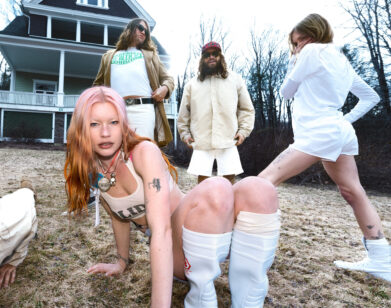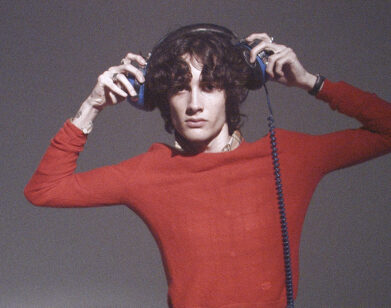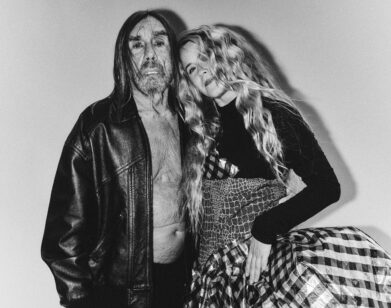Astronautalis Rises to the Occasion

ABOVE: ASTRONAUTALIS
Andy Bothwell, better known by his stage name, Astronautalis, is a blond-haired, blue-eyed, all-around wholesome looking guy. He’s also a sharp, freestyling prodigy with the mild-mannered disposition of an individual too smart for his own good. For the last decade, he has been navigating his way though the indie hip-hop scene, charming and captivating crowds all over the world.
Up until his latest album, This Is Our Science, he toured as a one-man show, traveling from gig to gig with nothing but his words and a laptop. Since then, he’s called on a live band, which has propelled him into creative overdrive. His music and performances are charged with a raw, explosive energy, but are also imbued with a whimsical complexity. Though his freestyles were what initially got people listening, Astronautalis has exceeded fans’ musical and lyrical expectations, creating arena-worthy rock ballads and lush pop tracks that challenge the idea of what it means to be a rapper.
LEA WEATHERBY: The recurring praise I’ve noticed almost always has to do with your performances being really unforgettable. How naturally does that come to you, and how would you describe what you do while you’re on stage?
ASTRONAUTALIS: To say it comes naturally would be dishonest on my part. There’s a lot of minutiae that’s sort of honed and sharpened over and over again to allow me the ability to elicit what I want out of a group of people—which, in turn, allows me to do whatever the hell I want on stage. I think I’ve gotten really comfortable being on stage, but there’s a difference between being comfortable and being precise. I also went to school for theater, so I do think in terms of staging as well. There are also subtle ways you can create a change in the audience’s relationship to the performer. The easiest is if you sit on the edge of a stage or you sit on a monitor, it connects the entire crowd, they change their connection to you. It becomes more of a solo performance in a theatrical sense and less in a musical sense. You happen to be singing songs, but you’re basically just giving a monologue.
WEATHERBY: Your freestyles draw in new fans pretty regularly, and it has become this craft that has garnered you a lot of notoriety and attention. People seem to expect it at almost all of your shows.
ASTRONAUTALIS: I think craft is the exact right word. It’s more of a craft and an art form. There are moments when it can transcend craftsmanship and get into art, and those are the moments that I really live for with freestyling, but most of the time it’s sort of pulling the quarter out from behind the audience’s ear. There definitely is a parlor trick element to the whole thing.
WEATHERBY: Could you describe what your process is at a show when you freestyle?
ASTRONAUTALIS: I take topics from the audience, I generally take about five topics, and I like to pick ones that are not normally discussed in rap music and make a story out of them. The early era of freestyle rappers, people like Supernatural, were doing things like what I was doing but they were just sort of mentioning the topic, not really weaving a story out of it and I like to find a way to tie them all together into a linear story. Sometimes linear stories are fictional or used allegorically for things that have happened in my own life, whatever works. So I take those things and I just make up a whole damn song.
WEATHERBY: Are you going to be modest and say that all of this can be attributed to practice?
ASTRONAUTALIS: I do believe to a great deal it is practice. It’s like learning a second language, and everybody starts off at zero. But there definitely comes a point when you’re in your Spanish class, where you see people that are just better at it than you, and they’re better at it than you because they worked harder, but they’re also better at it than you because they just see these things. Just the way someone is better at math or better at chemistry. I can just see, after practicing for a long time and freestyling for hours and hours a day all through high school, and my GPA was quite reflective of that, I was able to just see in advance. Like the way a chess player sees 10 moves ahead, I could be rapping something completely coherently in front of a crowd and be thinking, “Where am I going to go with this.” I just learned the language of rap music, and I’m pretty good at improv comedy, so I learned the right language and learned a couple of the right skills. So while I do feel that it’s something I am naturally better at than most people I don’t think that it’s something that came naturally to me, I just rose to meet it. I’m the kind of person that was probably designed to be good at freestyling, I just happened to fall in love with the thing that I was really good at it.
WEATHERBY: How did you decide on the live band, and how has that changed the dynamic with fans, and also your songwriting process and stage presence?
ASTRONAUTALIS: There are a couple of things. I never made my songs with a live show in mind. I always just tried to make the best songs I could and thought, “I’ll just figure out how to do this live later.” Because I see the album experience and the live experience as two separate and only mildly related entities, and I don’t feel a responsibility to take exact replications of the album songs live. So there came a point where I was starting to get frustrated because there were whole parts of my catalog that I couldn’t play, and it didn’t work in a traditional rap show setup with myself and a laptop or myself and a DJ. Another part of it was that I was just doing things one way for so long, and if I start to find myself getting bored then I need to change things, because it’s not too long after that the crowd will start to get bored. And that’s totally unacceptable. So ultimately, it just had to be done.
WEATHERBY: Where do you think you’re going beyond your own comfort zone and really testing your abilities—not only with freestyling and rapping, but as an artist overall?
ASTRONAUTALIS: I find with each album that I make, I’m getting more and more torn in my relationship to rap. I still think of myself as a rapper, even though a lot of the music I make isn’t rap music anymore. I still think about songs the way a rapper thinks about songs. I’m sort of a slave to end rhyme and to internal rhyme, and I’m in love with cadence, and it’s been really hard for me to shake because I appreciate the precision of the whole thing, and I find myself getting less and less good at blending genres and better and better at just having genres in stark opposition to each other.
WEATHERBY: You’ve said the track “Midday Moon” took you years to feel like you finally accomplished what you wanted to with it. What was that like?
ASTRONAUTALIS: I started writing that song when I was finishing my previous record, Pomegranate, and I was trying to make it work so it could be on that record. But it became clear to me over time that it wasn’t about what that record was about, it didn’t fit on there stylistically, so I sort of put it on the back burner. A song can be a little ticking time bomb in your brain for years. So a lot of times if I’m working on a song and it’s not flowing well, I’ll just stop it. Sometimes you’re just not ready for it, it’s not that it’s a bad song, you’re just not ready to make it a good song. So I waited for it to appear and eventually it did. You gotta be patient with that shit, because god damn it, man, it’s not easy to make a song, and sometimes you gotta wait a decade for it.
WEATHERBY: What is your goal for the next album?
ASTRONAUTALIS: In the last few years of traveling and seeing the world, I’ve had the really distinct pleasure of playing shows in a lot of places Americans don’t normally go and certainly don’t play shows in. And I’ve had the opportunity to see a lot of things that sort of change the way I thought about a great many things. Specifically, going to places where things are falling apart, where real problems happen, where people have to wait for food and not for a new iPhone. People in these situations that are far worse than situations that I grew up in, continue to put on concerts and make music and make out and fall in love in spite of the world around them. While I don’t intend to make a political record, I’m hoping that I can tell these sorts of stories through allegory, and people will listen to it and want to know more on their own and create their own development and growth. I’m not so fucking pompous to think that I can change the world or that I know what’s right for people’s lives, but I do believe I have a bit of insight into parts of the world that a lot of people haven’t seen, and I feel it’s my obligation to share that.
WEATHERBY: What can you tell me about things you can’t talk about at this time?
ASTRONAUTALIS: [laughs] I’m working on a project with my friend Ryan Olsen and my friend Sean Carey, who plays with Bon Iver, and a guy named BJ Burton from a band called The Love Language. I can’t tell you what it sounds like, I can’t tell you what it’s called, and I can’t tell you when it’s going to come out, but I can tell you that it is happening. So, that’s what I can tell you about things that I can’t tell you about.
ASTRONAUTALIS PERFORMS WITH WHY? TONIGHT AT THE MUSIC HALL OF WILLIAMSBURG. FOR MORE ON THE ARTIST, VISIT HIS WEBSITE.






